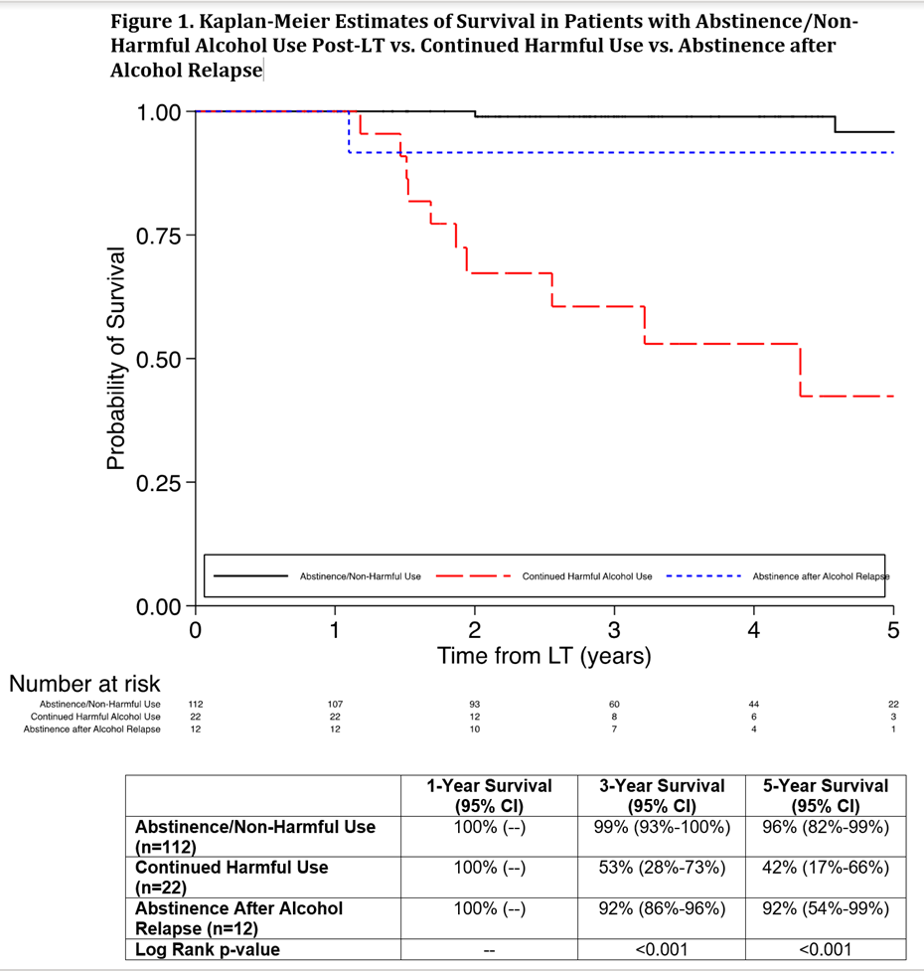Re-Establishing Abstinence after Alcohol Relapse after Early Transplant (LT) for Alcoholic Hepatitis (AH) Provides Survival Advantage
1U of WI SMPH, Madison, WI, 2UCSF, San Francisco, CA, 3Oschner, New Orleans, LA, 4Mt Sinai, New York, NY, 5U Penn, Philadelphia, PA, 6USC, Los Angeles, CA, 7NW Univ, Chicago, IL, 8Houston Mdt, Houston, TX, 9GTown U, Washington, DC, 10Swed Med, Seattle, WA, 11Rush Med C, Chicago, IL, 12U of MD, Baltimore, MD
Meeting: 2020 American Transplant Congress
Abstract number: 483
Keywords: Alcohol, Liver transplantation, Multicenter studies, Survival
Session Information
Session Name: Liver: Recipient Selection
Session Type: Oral Abstract Session
Date: Saturday, May 30, 2020
Session Time: 3:15pm-4:45pm
 Presentation Time: 4:27pm-4:39pm
Presentation Time: 4:27pm-4:39pm
Location: Virtual
*Purpose: Among the ACCELERATE-AH cohort: (i) Identify factors associated with re-established abstinence in patients with alcohol relapse after LT for alcoholic hepatitis (AH); (ii) Determine whether re-established abstinence can abrogate the deleterious effects of relapse on survival.
*Methods: Post-LT alcohol use retrospectively obtained every 3 months post-LT from 11 sites performing LT for AH from 2006-2018. Latent class analysis and Cox regression identified longitudinal harmful patterns of relapse post-LT, defined as alcohol patterns associated with increased risk of death. Patients with harmful relapse post-LT were classified as “re-established abstinence” vs. “continued alcohol use” by alcohol use status at last follow-up interval. Logistic regression examined pre and post-LT variables associated with re-established abstinence, adjusted for center clustering.
*Results: Among 146 AH LT recipients (median pre-LT abstinence 59 days) with 3.0 years (median, IQR 2.0-4.6) post-LT follow-up, there were 17 post-LT deaths, of which 10 were alcohol-related. A total of 34 patients had harmful alcohol relapse post-LT: 22 with continued use after relapse and 12 with re-established abstinence. 11 post-LT deaths occurred in those with continued use, whereas only 1 post-LT death occurred in those with re-established abstinence after relapse (p=0.008). In multivariable analysis, compared to those with sustained abstinence/non-harmful use post-LT, re-established abstinence after relapse had similar risk of death (HR 4.1, p=0.25), whereas continued harmful alcohol use increased the risk of death (HR 23.2, p<0.001) (Figure 1). Compared to those with continued alcohol use, length of post-LT hospital stay (OR 1.11 [per day], p=0.02), and non-Medicaid (non-state issued) insurance (OR=16.3, p<0.001) were associated with re-established abstinence after alcohol relapse.
*Conclusions: Re-establishing abstinence after post-LT alcohol relapse appears to abrogate the deleterious effects of harmful alcohol use on patient survival among recipients of early LT for AH. .
To cite this abstract in AMA style:
Rice J, Lee B, Therapondos G, Im G, Lazar A, Lucey M, Weinberg E, Han H, Maddur H, Ghobrial M, Hsu C, Fix O, Eswaran S, Shetty K, Jakhete N, Victor D, Foley D, Mehta N, Rinella M, Schiano T, Mobley C, Terrault N. Re-Establishing Abstinence after Alcohol Relapse after Early Transplant (LT) for Alcoholic Hepatitis (AH) Provides Survival Advantage [abstract]. Am J Transplant. 2020; 20 (suppl 3). https://atcmeetingabstracts.com/abstract/re-establishing-abstinence-after-alcohol-relapse-after-early-transplant-lt-for-alcoholic-hepatitis-ah-provides-survival-advantage/. Accessed February 27, 2026.« Back to 2020 American Transplant Congress

